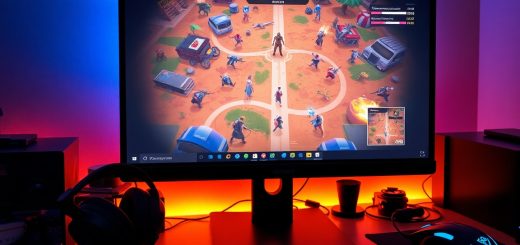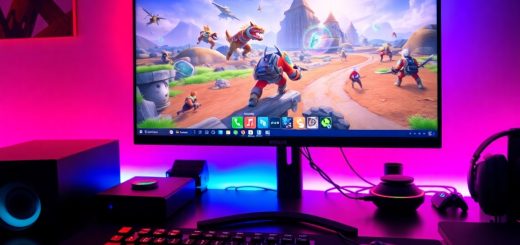How to Get the Best FrameRate in Your Browser Games
Ever felt like your browser game just can’t keep up? Like the screen is stuttering or lagging right when you need smooth action the most? You’re not alone. Getting the best frame rate in browser games can feel like chasing a shadow, but it doesn’t have to be that way. Think of frame rate as the heartbeat of your game’s performance—the higher and steadier it is, the smoother your gameplay feels. When it dips, you notice every hiccup, and that’s frustrating. But here’s the good news: there are simple, practical steps you can take to boost your frame rate and enjoy your games without the annoying pauses or freezes.
First, let’s consider what’s happening behind the scenes. Your browser is juggling a lot—web pages, extensions, background processes—and your game is just one player in that circus. If your browser is cluttered or bogged down, your game’s frame rate will suffer. It’s like trying to run a marathon with a backpack full of rocks. By tweaking browser settings, closing unnecessary tabs, and disabling extensions you don’t need during gaming sessions, you clear the path for your game to run smoother. Plus, clearing your cache regularly helps, because a bloated cache slows everything down.
But it’s not just about your browser. Your computer’s hardware is the engine driving your gaming experience. A weak GPU or limited RAM is like trying to race a sports car on a dirt road—no matter how skilled you are, the road limits your speed. Upgrading hardware or optimizing your system resources can give your games the boost they need. Sometimes, just closing other heavy programs can free up precious CPU cycles and memory, letting your browser game breathe easier.
Lastly, don’t overlook the power of smart software tools designed to help games run better. There are game boosters and frame rate optimizers that work quietly in the background, prioritizing your game’s processes and managing resources more efficiently. They’re like personal trainers for your PC, making sure every part is focused on giving you the best performance possible.
In the end, getting the best frame rate in your browser games is about combining these tips—cleaning up your browser, tuning your hardware, and using helpful software. It’s a mix of small changes that together create a big difference. So next time you launch your favorite browser game, remember: a smoother, more enjoyable experience is just a few tweaks away.
Optimize Your Browser Settings
When it comes to boosting your frame rate in browser games, the first place to look is your browser itself. It might sound simple, but tweaking your browser settings can make a surprising difference. Think of your browser as the engine of a car; if it’s cluttered or running inefficiently, your game won’t run smoothly no matter how powerful your PC is. So, where should you start?
First off, disabling unnecessary extensions is a quick win. Extensions can be sneaky resource hogs, running in the background and slowing everything down. Imagine trying to sprint while carrying a heavy backpack — that’s your browser with too many extensions. Just keep the essentials and ditch the rest.
Clearing your cache and cookies regularly is another gem. Over time, your browser stores a ton of data that can clog up performance. It’s like your browser’s memory getting cluttered with junk mail, making it harder to find the important stuff quickly. Clearing this out gives your browser a fresh start, often translating to smoother gameplay.
Adjusting settings like hardware acceleration can also help. Hardware acceleration allows your browser to use your computer’s GPU to speed things up. But sometimes, it backfires depending on your setup. If you’re experiencing lag, toggling this setting off or on might just be the tweak you need.
Don’t forget to keep your browser updated. Developers constantly improve performance and fix bugs that could impact gaming. Running an outdated browser is like trying to run a marathon in old shoes — it just isn’t efficient.
Here’s a quick checklist to optimize your browser settings:
- Disable unnecessary extensions
- Clear cache and cookies regularly
- Toggle hardware acceleration based on performance
- Keep your browser updated
By taking control of these settings, you’re giving your browser the best chance to deliver a smooth and responsive gaming experience. It’s a simple step, but one that often gets overlooked. Trust me, once you clean house in your browser, you’ll notice how much easier your games run — and that’s half the battle won.
Upgrade Hardware and System Resources
When it comes to boosting your browser game’s frame rate, sometimes tweaking settings just isn’t enough. Your computer’s hardware plays a huge role in how smoothly your games run. Think of it like trying to pour water through a tiny funnel—the smaller the funnel, the slower the flow. If your GPU (graphics processing unit), CPU (central processing unit), or RAM (random access memory) aren’t up to snuff, your game might feel more like a slideshow than an exciting adventure.
Upgrading your GPU is often the most noticeable change you can make. A stronger graphics card handles the visuals better, reducing lag and increasing frame rates. But what if you can’t swap out your GPU right away? Don’t worry—sometimes a simple driver update or adjusting in-game graphics settings can help your current hardware punch above its weight.
The CPU is the brain of your system, managing game logic and physics. If it’s outdated or overloaded, your frame rate will suffer. Upgrading to a faster processor can give your games the boost they need, but keep in mind that some browser games are more CPU-intensive than others. It’s like upgrading from a bicycle to a motorcycle—your ride gets faster, but only if the road (game) allows it.
RAM is another critical piece of the puzzle. Not having enough memory means your system struggles to keep all the game data handy, causing hiccups and slowdowns. Increasing your RAM lets your computer juggle more tasks smoothly, which can make a big difference in frame rates and overall gameplay responsiveness.
Here’s a quick glance at how these components impact your gaming experience:
| Hardware Component | Impact on Frame Rate | Upgrade Tip |
|---|---|---|
| GPU | Handles rendering and visuals, key for smooth graphics. | Choose a modern card with good browser game support. |
| CPU | Processes game logic and physics, affects overall speed. | Opt for a faster processor with multiple cores. |
| RAM | Stores active game data, prevents lag spikes. | Upgrade to at least 8GB for most browser games. |
Don’t forget about system resources too. Closing unnecessary programs and background tasks frees up power for your game. It’s like clearing traffic off the highway so your game data can zoom through without delay. Sometimes, a little housekeeping on your computer can go a long way before you invest in new hardware.
So, before you get frustrated with choppy gameplay, take a moment to consider your hardware and system resources. A few smart upgrades or tweaks might just transform your browser gaming from a bumpy ride into a smooth cruise.
Use Performance-Enhancing Software Tools
When it comes to squeezing every bit of performance out of your browser games, relying solely on hardware upgrades isn’t the only answer. Believe it or not, the right software tools can make a surprising difference in your frame rates and overall gameplay smoothness. Think of these tools as your personal pit crew, fine-tuning your system behind the scenes so your game runs without hiccups.
One popular category is game boosters. These programs temporarily shut down unnecessary background processes and free up system resources, giving your browser game more breathing room. It’s like clearing traffic on a busy highway so your game data can zoom through without delays. Some game boosters even prioritize network traffic, reducing lag caused by internet congestion.
Another helpful tool is frame rate optimizers. These software solutions specifically target the way frames are rendered, smoothing out choppy visuals and reducing stutter. While they don’t physically increase your hardware power, they cleverly manage how your system handles graphics, often resulting in a noticeably smoother experience.
But don’t just take my word for it—here’s a quick comparison of common software tools and what they bring to the table:
| Tool Type | Primary Benefit | Effect on Frame Rate |
|---|---|---|
| Game Boosters | Shut down background apps and free RAM | Moderate increase |
| Frame Rate Optimizers | Improve frame rendering and reduce stutter | Noticeable smoothing |
| Network Optimizers | Prioritize gaming traffic, reduce lag | Indirect improvement |
Of course, not all software is created equal. Some tools might promise the moon but deliver little, or worse, hog your resources. It’s important to pick well-reviewed and trusted programs. Also, keep an eye on how these tools interact with your system. Sometimes, running too many optimization apps at once can backfire, causing conflicts and slowing things down instead of speeding them up.
In my experience, a simple game booster combined with a reliable frame rate optimizer can turn a frustratingly laggy browser game into a smooth, enjoyable session. It’s like having a backstage crew working tirelessly so the show goes on without a glitch. So, before you dive into your next browser game, consider giving these software tools a try—they might just be the secret ingredient your setup needs.
Frequently Asked Questions (The title must be written in English.)
- Why is my browser game lagging even though my internet speed is fast?
Great question! While a speedy internet connection helps, lag often comes from your computer struggling to keep up with the game’s demands. Think of it like trying to run a marathon in flip-flops—your hardware (CPU, GPU, RAM) needs to be ready to sprint. Optimizing browser settings and freeing up system resources can make a huge difference in smoothing out gameplay.
- How can I easily boost my frame rate without buying new hardware?
You don’t always need to break the bank! Start by tweaking your browser settings: disable unnecessary extensions, clear your cache, and close background tabs. Using performance-enhancing software like game boosters can also prioritize your system’s resources for gaming, giving you a noticeable fps bump without spending a dime.
- Do all browsers perform the same for gaming?
Not at all! Some browsers are leaner and more optimized for gaming than others. For example, browsers like Google Chrome and Mozilla Firefox often offer better support for web games, but heavy extensions or outdated versions can drag performance down. It’s like choosing between a sports car and a minivan—both get you there, but one does it faster and smoother.
- Is upgrading my RAM really going to improve my browser game’s frame rate?
Absolutely! RAM acts like your computer’s short-term memory, helping it juggle multiple tasks. If your system is starved of RAM, your browser game might stutter or freeze because it can’t access data fast enough. Upgrading RAM is like adding more lanes to a highway, letting data flow freely and boosting your gaming smoothness.
- What are game boosters and do they really work?
Game boosters are nifty software tools designed to optimize your PC’s performance by shutting down unnecessary background processes and allocating more resources to your game. Imagine them as personal trainers for your computer, helping it focus all its energy on delivering a silky-smooth gaming experience. While results vary, many gamers find them a handy addition to their toolkit.
- Can clearing browser cache improve my game’s frame rate?
Yes, it can! Over time, cache builds up like clutter in a closet, slowing down your browser and, by extension, your game. Clearing it out refreshes your browser’s memory, often resulting in quicker load times and smoother gameplay. It’s a simple spring cleaning trick that packs a punch.


